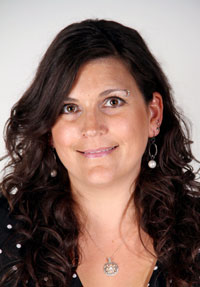Updated on November 20, 2020
Fernanda Bueno, Esq.
One alumna’s journey from immigrant to fighter and advocate for an underrepresented group that is challenged even more so since COVID-19.
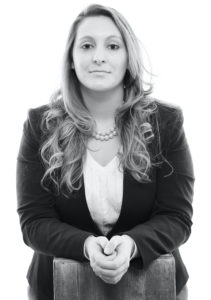
Fernanda Bueno, Esq. ’11
Born in Brazil, Fernanda Bueno immigrated to the United States at the age of 16. She facedevery hardship expected as a foreigner and non-English speaker, which motivated her to help other immigrants have an easier journey than she did.
She now leads a team of immigration warriors, fighting tirelessly for victims of domestic violence, the LGBTQ community, and refugees. She speaks loudly for those who do not have a voice, and stands tall between her clients and the deportation machine. Hear her story…
How COVID-19 has affected my field
The immigration field has been hit hard by COVID-19. Most of our clients are from the Latino community and considered essential workers, which means that a lot of them were exposed to the virus and eventually tested positive. We had to close our physical office, send our employees home, and do all of our work remotely because we still had to honor our deadlines for client eligibility. This change was especially challenging because many of our clients are indigenous, have no access to any sort of technology, or simply live in a crowded environment where it becomes impossible to have a confidential conversation. A lot of them are unable to read, which makes emailing or texting impossible. Many do not have a computer or a smartphone, so even simple things like sending a picture of a document were challenging.
Additionally, this administration’s response to COVID-19 was to essentially shut down our borders and stop the issuance of documents that had been previously approved. This placed an immediate hold on our family cases and all of our clients who had been waiting for employment authorization or a green card. So clients who had been waiting for years for a chance to come in legally were now told that they were banned until further notice.
We have been blindsided by several changes in immigration law recently, and we’ve had to work around the clock to push our cases through before our clients became ineligible for immigration benefits. This was especially hard because clients were not allowed to come in physically, and our team was not able to work as fast as we needed to.
Clients lost their jobs due to the pandemic, and were afraid of asking for any unemployment benefits because, earlier this year, we had a new public charge rule come into effect. This rule essentially punishes any immigrants who have applied for a public benefit. Under this rule, being unemployed is also a heavy negative factor, which unfortunately became a challenge for most of our clients.
Our clients were sick, unemployed, unable to ask for any financial help, unable to meet with their attorney to prepare their case, and forced to magically meet deadlines before this administration changed the rules on us yet again. Internally, dealing with the constant changes in the law while handling a full caseload and surviving a global pandemic definitely took a toll on our team.
What my NDNU experience meant to me and my career
When I came to NDNU, I had recently moved from my home country of Brazil, and NDNU became the only home that I knew. It was at NDNU that I learned English, formed my political opinions, and discovered that helping my immigrant community was my calling in life. Had I not been encouraged by my advisor, the magnificent Stephen Cole, to read the Amnesty International magazines outside of his office, I might not have become an immigration attorney. His ability to recognize that inclination in me has allowed me to touch the lives of thousands of people. I was also taught by Ali Ferdowsi that, as members of a community, we become co-responsible for the well-being of all. That we must speak up for those who can’t speak for themselves in times of need, and that remaining quiet, though comfortable, is rarely the right thing to do. Every now and then in my profession, I am given a choice between doing a mediocre job and working a lot harder to become excellent. It is because of my NDNU education that I have always chosen excellency.
Favorite memory from NDNU
During my first year at NDNU, my English was extremely limited and I spoke with a heavy accent, which made me incredibly self-conscious. One day, I met with Professor Ferdowsi (also an immigrant) and I mispronounced a word, and he gently corrected my pronunciation. I immediately fell back on my chair drowning in shame. Seeing that I was uncomfortable, he said “don’t be ashamed. The fact that you have an accent means that you speak more than one language. And the more languages you speak, the more I like you.” That was a defining moment for me. A moment of acceptance and camaraderie that allowed me to become unafraid and unapologetic about who I was.
– Fernanda Bueno, Esq. ’11
Follow her on social:
![]() @buenoimmigration
@buenoimmigration ![]() @buenolawoffice
@buenolawoffice
Updated on June 1, 2020
Improving Patient Care and Safety during COVID-19: A Note from Patrice Callagy
Prepared for Disaster: How Drive-Though Treatment Garages Improved Emergency Care
As the Executive Director of Stanford Health Care (SHC) Emergency Services, I’ve been immersed in making sure SHC continues to provide best-in-class healthcare, preserve public confidence in us, and maintain staff and patient safety throughout the COVID-19 pandemic.
Fortunately, SHC regularly conducted disaster simulations with both our pediatric and adult Emergency Departments (EDs) which include infectious agents. Because of our commitment to preparedness, we were poised to deal with the initial surge in patients at the EDs that was associated with an evolving, worldwide pandemic.

NDNU Alumna Patrice Callagy ’83, ’91 with staff from Stanford Health Care Emergency Services
Strong, interdisciplinary working relationships between the various departments is one of our strengths, as is adaptability and innovation. Because these foundations were already deeply ingrained in our core, we were able to quickly meet the many, various demands of the COVID-19 pandemic. Key to our success was the seamless working relationships between ED nursing.
MD leadership and staff. All of this was put to the test in the early days of the pandemic when, as an example, we needed robust protocols to safely, efficiently and effectively identify and segregate potential COVID-19 patients from non COVID-19 patients seeking emergency care. My role included forming multiple, interdisciplinary committees as we met the workflow and practice challenges caused by COVID-19.
I was pleased that SHC and other healthcare facilities relied on a 2009 publication I co-authored about a drive-through treatment garage, and SHC’s disaster simulation that validated the feasibility of the drive-through treatment garage. Our 2009 simulation demonstrated that a drive-through treatment garage could be quickly implemented during a pandemic to segregate patients, increase social distancing and increase capacity to meet patient surges. At the beginning of COVID-19, I fielded numerous calls from other healthcare facilities wanting to implement a drive-through treatment garage or something similar. Lessons learned in that 2009 simulation enabled us to safely implement a COVID-19 garage drive-through care area within just 12 hours of identifying an increase in our ED patients. Because of our early preparation for the garage drive-through system, patients presenting to our ED remained safely in their cars while a nurse provided the triage, treatment and care, and an ED physician provided a telemedicine video visit. Our drive-through treatment garage enabled us to reduce the length of stay to an average of 25 minutes for the patients seen through the garage care area, which significantly increased patient throughput at a time when we were experiencing significant patient surges.
I’m most proud of our commitment to our employees to keep them safe. Every hour of every day I saw our employees working tirelessly to help others through this crisis. We demonstrated our commitment to their safety and its success by testing all hospital employees and medical staff for COVID-19 as well as COVID-19 antibodies.
I have complete confidence in the hospitals and emergency rooms around the country and want patients to feel safe to return to them for emergency care. However, patients should expect that ED visits will be different from previous, pre-COVID visits. For example, upon arrival at a SHC ED, a patient will be screened and have a temperature check by a nurse prior to entering the ED. All staff, patients and their one ED visitor will be required to wear a surgical mask, and if there is a wait, there will be multiple, segregated waiting areas to promote social distancing. Also, at the SHC EDs, the majority of patients will receive a COVID test and will have a result within 2 hours. I expect the same or similar protocols are in place at other EDs. While some of this may sound inconvenient, it will ensure that EDs are safe and uphold public confidence in its healthcare system.
Updated on April 16, 2020
Tips for Online and Remote Learning
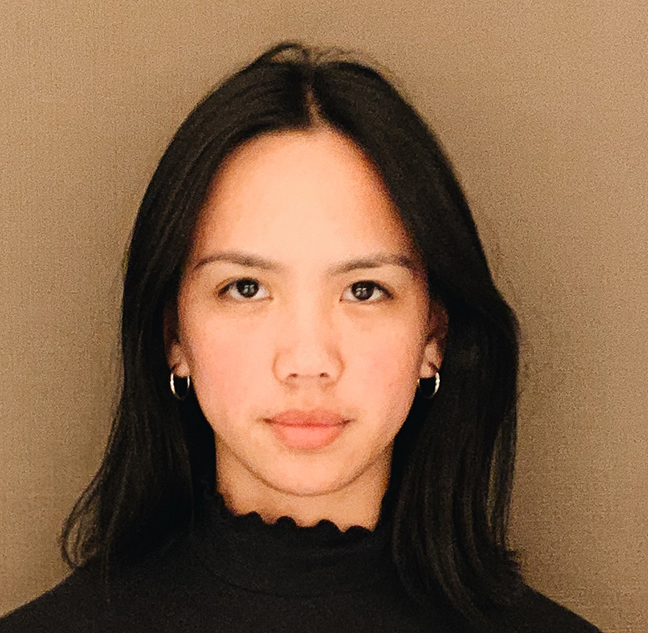
Frances Eusebio, Notre Dame de Namur University student
Online or distance learning requires heightened time management because of its rigorous and individual nature. Remote learning may also lead to student apathy, which makes it difficult to keep up with work.
It’s not easy to stay focused when you’re learning online
When classes and work are online, it can be difficult to stay focused, especially if you’re caught up in the world of social media and the Internet, and if you’re like me, with a limited attention span. I can lose interest as soon as a video reaches the one-minute mark!
Set alarms to keep on schedule
But do not fear, there is always a solution! To keep productive, set schedules and reminders. Make it a habit to start your day by planning a schedule for the rest of your day. The alarm clock on your phone doesn’t just come in handy when you need a wake-up call. Use your alarm to remind you throughout the day when online classes begin, when you should start doing work, exercise, watch a movie, and even when free time starts! Having an alarm is the perfect way to stay on schedule, especially if you’re having problems keeping motivated.
Take notes
Remember that online Zoom classes still carry the same weight as face-to-face classes. Taking notes is essential. It gives you something to do, all while listening attentively during class. I trust the Notebook app to keep all my notes for classes coordinated and neat.
Stay connected
When almost everything is virtual, it’s difficult to connect with professors and fellow students. A mantra most students would agree on is, “In strong Internet connection and Zoom we trust.” It’s important to stay in touch with your professors, so email them from time to time, either to check in about how you’re doing in the course, or even to know how they’re doing. Your professors would be grateful to hear from you.
Hold online study groups
Hold Zoom virtual study groups and do schoolwork with your classmates. Schedule a time every week to meet with your study group to go over the work assigned for the class. If there’s no homework, you can always use a catch-up session to see how your classmates are doing. We all need somebody to lean on during this time of isolation.
Stay entertained, stay healthy, stay active
Being stuck at home can lead to lethargy, and it’s also difficult to keep yourself entertained. But thanks to the World Wide Web, there are thousands of sites and apps to keep yourself entertained as you confine. To stay healthy, limit junk foods and fill yourself with healthy foods rich in protein, vegetables, and fruits. I know this can be difficult, but quarantine also means you get to channel your inner home cook. Browse the web for sites such as allrecipes.com and Epicurious and look up healthy recipes to spice up your meals. Most ingredients can be found at home. Another way to stay healthy is by doing online workouts. Go to YouTube and follow the easy steps of cardio, yoga, or HITT. Get in shape and stay active!
Find options to keep entertained
To entertain yourself, binge your favorite movies and TV shows. I’ve been watching the movie Love Wedding Repeat on Netflix and Gordon Ramsay’s Uncharted documentary on Disney+. Venture out to foreign cinema and research the films of countries around the world. If you want something more audio than visual, go for podcasts! Spotify offers a whole selection of genres. If you like crime, listen to “The Dating Game Killer,” or “WTF with Marc Maron” if you want some comedy. If you want to put the device down, head over to the Kindle app and buy a good book. I’ve been reading Sally Rooney’s romance coming-of-age novel Normal People and have the detective fiction book Death on the Nile by Agatha Christie next on the list. Follow book clubs and blogs to see what everyone’s reading!
The world is experiencing uncertain and challenging times, and everyone should do their part to help heal the world. May this be a time of self-reflection and restoration as we lean on each other for support. Times are difficult, but together we can overcome this. We are stronger than whatever challenge we face, and the true test lies within ourselves.
Updated on February 18, 2020
Dr. Stephanie Demaree Named NASA Solar System Ambassador
Dr. Stephanie Demaree, who heads the Liberal Studies program at Notre Dame de Namur University, was recently named a Solar System Ambassador by the National Aeronautics and Space Administration (NASA). Solar System Ambassadors are highly trained volunteers who share NASA science and discoveries by holding educational events in their communities.
“This is an exciting time to be a Solar System Ambassador—NASA is preparing for the Artemis missions that will send astronauts to inhabit the Moon and then Mars for extended periods,” Dr. Demaree commented. “NASA has also recently developed innovative classroom materials to help educators communicate the excitement of space exploration to school children and to adults.”
Dr. Demaree first became involved with NASA through a program of summer institutes that the space agency held for teaching credential students. For several years, she served as the faculty sponsor for a group of Notre Dame de Namur students who took an intensive five-day summer training at NASA’s Ames Research Center in Mountain View. Dr. Demaree attended the sessions with her students and supervised them as they learned about lesson plans that taught cutting-edge science using fun activities.
“One lesson in the NASA curriculum that the students really enjoy is learning about craters,” she describes. “You fill a container with flour, and then coat it with chocolate powder to represent the surface of a planet. Then the students drop objects into the container from different heights and angles to see how meteors form craters, and how even a relatively small object can displace an enormous amount of material. It helps explain how the dinosaurs became extinct, for instance.”
Dr. Demaree hopes to bring lessons like this to local elementary school classrooms and to public events in the San Francisco Bay Area. She intends to hold a NASA-related community event in the near future on the Notre Dame de Namur University campus.
“One aspect of STEM education that NASA is focusing on now is the engineering component,” she elaborates. “How do you build a lasting, human habitat on Mars, for example? The idea is to apply the concepts you learn in science to practical problems, which is what engineers do. If you’re designing a habitation for another planet, you have to think systematically—once you’re on Mars, you can’t just run to the nearest grocery store.”
For information on applying to Notre Dame de Namur University, please visit the Admissions page.
Updated on November 19, 2019
Braving The Bohemian: Editing a College Literary/Arts Magazine
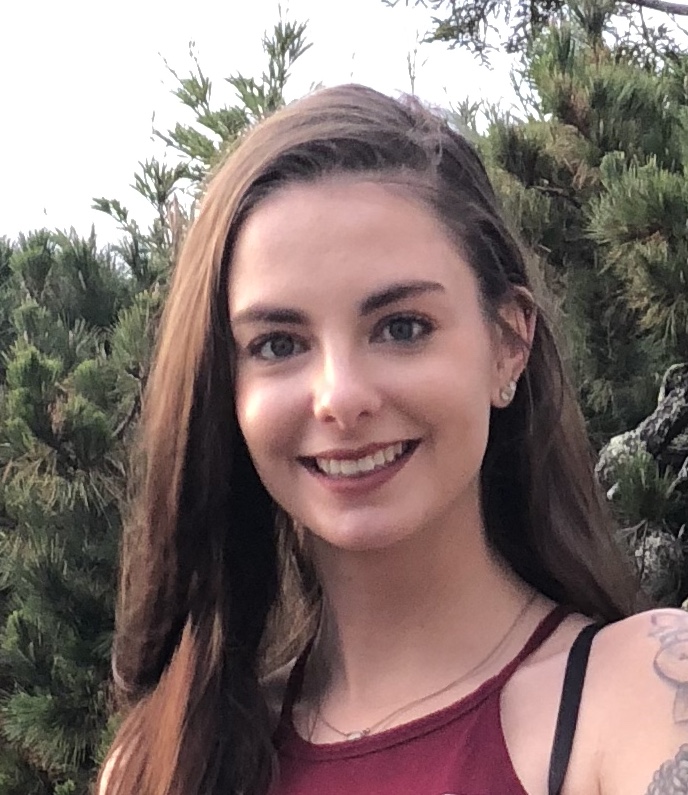
Notre Dame de Namur University
Student Olivia E. Smith
When I started working on Notre Dame de Namur University’s art and literary magazine, The Bohemian, I had no idea what I was getting myself into. My advisor, Professor Vince Fitzgerald, recommended that I give it a shot, and the idea appealed to me immediately. Why? I’m an English major and I naturally love literature, from The Girl with the Dragon Tattoo to Edgar Allan Poe short stories. I also like art museums, especially the Metropolitan Museum of Art in New York. The Bohemian wound up being one of my favorite things I’ve participated in at college thus far.
The group of student editors was very small that first semester. It was just me, two other students, and our faculty advisor. Our first undertaking was to set up the cover art contest and think up ways to get people to submit. It sounded easy enough, but this actually wound up being one of the most difficult tasks. We had to table, make flyers, advertise in the student weekly email, and make announcements in our classes. At first, submissions were coming in as slow as a turtle after a nap. I understood the trepidation. Sharing a creation, whether art or writing, is a daunting decision. Creating can be a deeply personal process, and it takes serious courage to share that in a magazine that might be read by the guy who sits next to you in World History.
Luckily, by the time the spring semester rolled around, our staff had expanded and we had many brave souls willing to submit and trust us with their art and writing. This, however, came along with an intense feeling of responsibility. By this time, our faculty advisor had appointed me editor-in-chief of the 2017–2018 issue of The Bohemian.
I took this role very seriously. The way I saw it, people had trusted me and the other editors with their creations, and oftentimes with their deeply personal stories. We had people write about death, suicide, and rape; as well as school, friendship, and love. So much of the work we received that year was incredibly touching and very heartfelt. Our contributors really put their all into their work, and it showed:
“She’s going to drop into your world out of nowhere and a small spark, like a firefly, is going to buzz around your rib cage.”
This is a line from one of my personal favorite pieces we included, “The Five Steps to Falling in Love with Kaitlyn,” by Rowan Jack.
The staff of The Bohemian was now tasked with choosing which pieces would be included, and how they would be edited and placed. We didn’t make any major editorial changes, but we did have to comb carefully through each piece for spelling and grammar mistakes. Far more difficult was making the choices of whose work would be included, and for people who submitted multiple pieces, which ones to choose. The submitters had clearly put so much soul into their artwork and writing, and we didn’t want anyone to feel left out. Everyone on The Bohemian team had a vote on which pieces should be chosen. Remarkably, for the most part, we were in agreement, but there were definitely some pieces that I would have liked to see included that didn’t end up in the journal and vice versa. In the end, we wound up with a publication we all could be very proud of, but the work didn’t stop there.
The Release Party was the most daunting task for my secretly very introverted self. My outer confidence in social situations is entirely on a “fake it till you make it” basis, and this was going to require a great deal of social interaction. I was nervous, but I knew how important this party was for the success and sales of the journal. The first portion of the release party was readings from our contributors, but we still had to get up in front of everyone and introduce each reader. Next was the open mic, which can be very awkward if no one is willing to get up and read. Luckily, after some persuading, a few courageous souls volunteered and got everyone into the swing of things. We had some readers who made everyone laugh, and some who made everyone cry (okay, not everyone cried, but no one was left unmoved!).
Again, there was a sense of responsibility to provide an event and a space that made people comfortable enough to share their work in front of an audience. Maybe it’s the overall kindness of the Notre Dame de Namur community that made that possible, maybe it was the affirmation of their being published. We ended up with a successful release party and a finished journal that I, for one, am so incredibly proud of. I am so glad we were able to convince the community that The Bohemian was (and still is!) a powerful and moving project, just like any work of art or collection of writing.
Olivia E. Smith is a senior at Notre Dame de Namur University majoring in English. She edited the university’s literary/arts magazine The Bohemian. Her blog Roses and Rambles deals with culture and women’s issues.
For information on applying to Notre Dame de Namur University, please visit the Admissions page.
Updated on November 1, 2019
From Pickle Sandwiches to Open Mics: Confessions of a Commuter Student

Notre Dame de Namur University
student Olivia E. Smith
When I first started at Notre Dame de Namur University (NDNU), I was not particularly interested in the traditional college experience. I’ve never liked being in crowds. I wanted a small and personal environment, and I didn’t want to live on campus. I was more interested in the school part of college than in dorm life.
Lots of people told me this was nuts, and I should take advantage of this time to live with my peers and truly experience everything that the traditional college life has to offer. I was worried I had made the wrong decision when I chose not to live in the dorms. It took me a while to adjust to being a commuter student and really figure out the tips and tricks to making the most out of college life while living elsewhere.
Now, in my last semester, I feel as though I’ve finally got a good system down. I’ve learned to always leave time for the unexpected delights of the morning commute. I’ve learned that the commuter lounge is a much nicer place than my car to take a break and eat my cheese and pickles sandwich (I alternate sweet and sour depending on my mood). I’ve learned that just because dorm life isn’t for me doesn’t mean I’ve wasted my college years. I found the right environment that allowed me to flourish as a student, and for me, that’s what the undergraduate experience is all about.
Most of my friends, at NDNU and other colleges, made the choice to live on campus, and I don’t know anyone who regrets that decision. Living on campus is a great way to have built-in friends in your roommates, and be more involved in college life. Being a commuter, I struggled with that aspect of college. It took me several semesters at NDNU before I participated in anything besides scrambling to find parking, attending classes, and going home.
That all changed when my advisor suggested I sign up to work on The Bohemian, Notre Dame’s art and literature magazine. I was nervous because this was the first time I would be participating in campus life in any capacity, but I fell in love with The Bohemian immediately. Before I knew it I was tabling to get people to contribute work to the magazine, and attending the open mic night and the publication party. From there, I went on to be a tutor in the Writing Center and that allowed me to expand my social circle even further. These little ways of getting involved with the community have made my time as a commuter student much easier and much less isolated.
As a commuter student, I didn’t want to spend the rest of my college education feeling like I was missing out on something. As the semesters went by, however, I fell into a very comfortable routine. I learned how to be a commuter student and still enjoy all the fun that campus life has to offer. There have definitely been challenges to being a commuter student, and it might not be the right choice for everyone, but it was the right choice for me.
Olivia E. Smith is a senior at Notre Dame de Namur University majoring in English. She edited the university’s literary/arts magazine The Bohemian. Her blog Roses and Rambles deals with culture and women’s issues.
For information on applying to Notre Dame de Namur University, please visit the Admissions page.
Updated on October 1, 2019
Finding My Calling at Notre Dame de Namur University
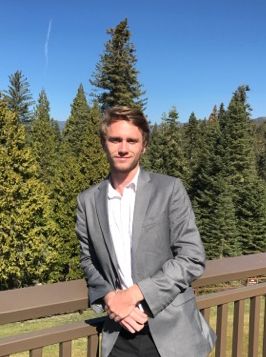
Perry Elerts, NDNU Graduate
Ever since I was twelve years old, I thought I knew what I wanted to do with my life. I was positive I wanted to go to college and become a psychologist. I’m not sure what instilled in me this strong desire to be a psychologist. Maybe it was all the crime TV I use to watch. I was always fascinated with how the detective would try to get into the mind of the criminal. I followed this desire and went to Notre Dame de Namur University (NDNU) to major in psychology.
At NDNU I loved all my psych and sociology classes and couldn’t get enough of them. During my second year, I started to look for jobs in the field of psychology and found a few, but none of them were calling out to me. So, I instead took a job as a Bonner leader. The Bonner leaders are students who work through the Sister Dorothy Stang Center for Social Justice and Community Engagement at NDNU to do community service.

Callippe Silverspot butterfly, endangered species on San Bruno Mountain
I worked at San Bruno Mountain Watch, a nonprofit dedicated to restoring one of the most biodiverse places on the planet. San Bruno Mountain sits right at the southern border of San Francisco, California. There I helped remove invasive species and planted native plants. Native plants are needed to support the three endangered butterfly species that live on the mountain. It was through this experience I discovered my passion for environmentalism.
Following my newly kindled passion for environmentalism, I talked to my academic counselor and added a second major in social justice. With a background in psychology and new knowledge about environmental studies, I became fascinated with the intersection of the two fields. I wanted to research the effects of natural environments on the human psyche. Through reading some of the research, it became obvious to me that nature has a deep and, in some ways, unexplained positive effect on the human psyche. I realized that preserving natural places is crucial to human mental and physical health.
It was through this experience at NDNU that I learned the difference between a passion and an interest. Yes, I was interested in psychology, and it’s a great field, but I was passionate about environmental justice. I wanted to do my part to make the world a just and better place.
The next challenge I faced was how was I going to help do this. So, I did some reflecting and read about some of the most influential and impactful world leaders. I knew I wasn’t the first person to want change or to feel strongly about protecting the environment. After some reflection, I noticed an occupational commonality among many of the world’s leaders; they are all lawyers. Some of these lawyers I looked up to included Mahatma Gandhi, Nelson Mandela, over half the U.S. presidents, and the notorious Supreme Court Justice Ruth Bader Ginsburg.
Following my heart I applied and was accepted to University of California Hastings College of the Law. Three years later and I am now a law school graduate. With my degrees in hand, I was hired by the Center for Biological Diversity in their Environmental Health program, working to protect biodiversity and human health from toxic substances while promoting a deep understanding of the inextricable connection between the health of humans and all other species. I absolutely love my job and can’t imagine doing anything else with my life. I have found my purpose.
Perry Elerts graduated with a bachelor’s degree from Notre Dame de Namur University in 2016, and a JD from Hastings College of the Law in 2019. He currently works at the Center for Biological Diversity.
For information on applying to Notre Dame de Namur University, please visit the Admissions page.
Updated on September 24, 2019
Working Smart and Working Hard:
The Life of a College Student with a Job

Notre Dame de Namur Student
Olivia E. Smith
In the movies, college is all football games and huge parties with lots of red Solo cups full of free beer. But in real life, college can be stressful, crammed with grades, professors, roommates, and the weight of the future to worry about. On top of all of that, many of us also have to deal with a job outside of school. It‘s not always financially possible to focus only on studying and degrees. Juggling the responsibilities of a student and an employee can be super overwhelming, but here’s how it can be done.
For the last four years, I’ve been a nanny for a wonderful family with two boys. I’m lucky with my job, and I get to work for amazing people with really great kids every day. That isn’t to say that it’s always smooth sailing. A lot of my vocabulary test flashcards end up with peanut butter stains on them, and I spend afternoons at a sweaty dojo learning linguistics while the kids do karate.
One night, right before a midterm, I was babysitting the boys, helping them with their homework. One of the boys had lost a critical page of math homework due the next day. Chaos ensued, and I was facing the business end of a temper tantrum when I was already totally stressed about my test. My babysitting charge then decided to line up all the Furbies in the house across the staircase. They all started talking at once, and they won’t turn off until you rock them to sleep. So, I’m standing on the stairs, trying to convince a seven-year-old to come downstairs and finish his homework, while simultaneously trying to get a creepy robot toy to go to sleep. All the while, I’m running through what’s on the linguistics test tomorrow about how to write my name in the phonetic alphabet.
I got through that night and many others like it. It wasn’t all that easy, but it was possible. With the support of my NDNU professors, who I always found very understanding of my overly busy schedule, I have managed to make it through to my final semester. It’s all about finding a balance and finding a community that’s supportive of juggling priorities.
Being a student with a job hasn’t always been easy, but it has taught me some very valuable skills that are going to come in handy for the rest of my life. Time management is essential. Planners are God’s gift to anyone with more than one thing going on in a day. When a project is assigned, I try to start it that same day. On the work side, I schedule my classes so I have time to get to my job and not arrive late. Also, I set aside one day each week when I do neither work nor school and just bake chocolate cupcakes—my roommates and family wouldn‘t let me make any other flavor.
Olivia E. Smith is a senior at Notre Dame de Namur University majoring in English. She edited the university’s literary/arts magazine The Bohemian. Her blog Roses and Rambles deals with culture and women’s issues.
For information on applying to Notre Dame de Namur University, please visit the Admissions page.
Updated on December 6, 2019
An Executive Director’s Career Path: MPA Graduate Judith Guerrero
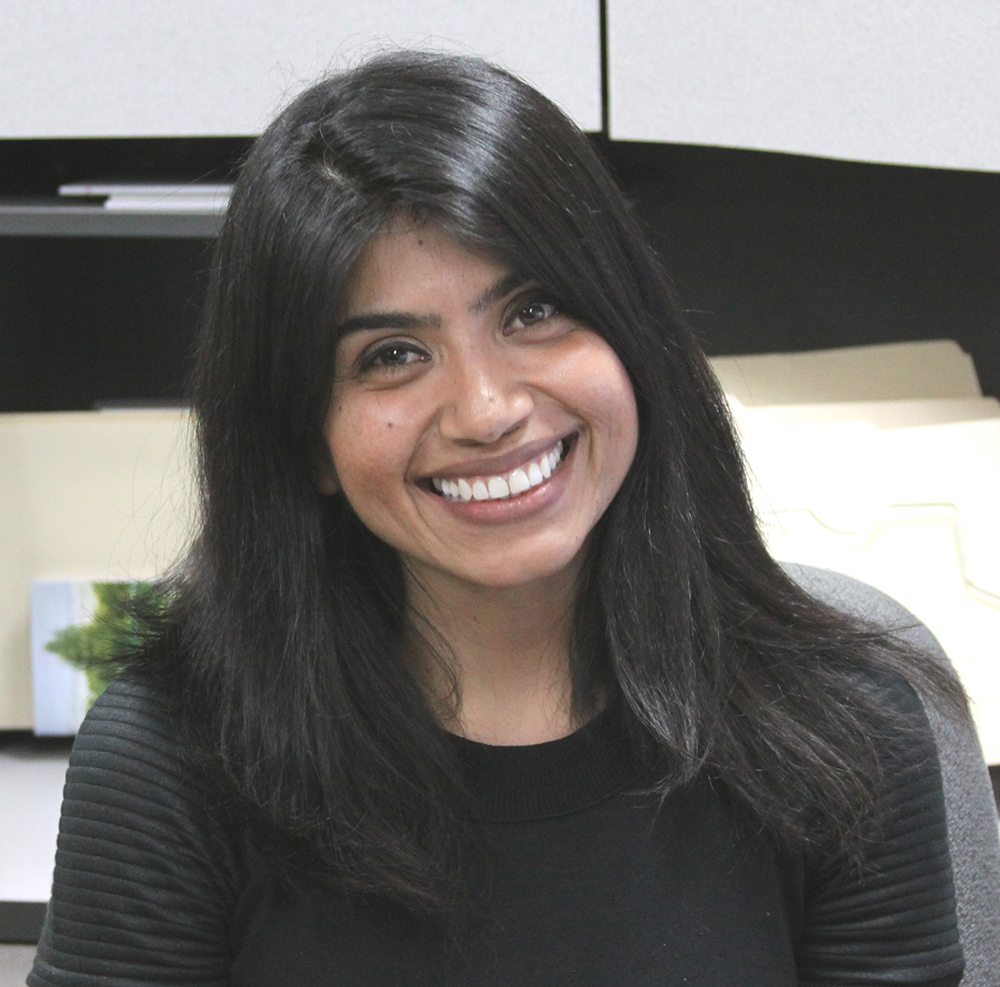
Judith Guerrero, Master of Public Administration graduate of Notre Dame de Namur University
When she was 11, Judith Guerrero emigrated with her mother from Mexico. Judith grew up in the town of Half Moon Bay, on the California Coast.
“When I first got to the United States, not speaking English, and my mother working in agriculture, it seemed that attending college and grad school was a far-off dream,” Judith recalls. She was able to enroll in a state university, thanks to her good grades and a partial scholarship from Coastside Hope, a nonprofit that provides safety net services to the working poor, the homeless, low-income seniors, and those in crisis.
“I had to take public transit each day 40 miles to college, rushing to make the first bus out of Half Moon Bay at 6:10 a.m.,” Judith says. “I got home pretty late at night, because I crammed all my classes into two days in order to have a full-time job the other days of the week.”
Judith excelled in college despite the obstacles, and when she graduated she was admitted to the Master of Public Administration program at Notre Dame de Namur University. (The program is offered both in the classroom and in an online format.). “I loved the MPA program,” she says. “The courses related real-life experience in the workplace to what we were studying.”
She also found her community in the program: “It’s a small campus, so we formed close bonds with other students and with the faculty. I developed a strong support network that I still have today.”=
There was one professor, though, whose reputation intimidated Judith: “Professor Jeff Cox was known as a stickler for enforcing all the style guide rules on students’ papers. I put off taking his class till my last semester.” Not only did Judith do well in the class, she also got to know her instructor, who lives not far from her. “He and his wife have become both friends and mentors to me. The faculty in the MPA program are people I call on if I ever have a problem—they always help,” Judith adds.
After earning her MPA degree at Notre Dame de Namur, Judith became the executive director of the Boys & Girls Club of the Coastside, a nonprofit that engages underserved youth in afterschool activities. Recently she changed jobs and is now the executive director of Coastside Hope, the same nonprofit that funded the scholarship that enabled her first to attend college.
“I guess you could say that things have come full circle,” Judith remarks. “I find my career very rewarding. One of the most worthwhile things is to see your work impact other people’s lives.”
The Master of Public Administration program at Notre Dame de Namur University is offered both in the classroom and online. To apply to any program at Notre Dame, visit the admissions page.

